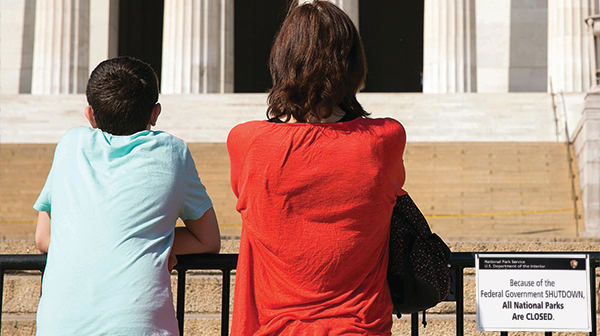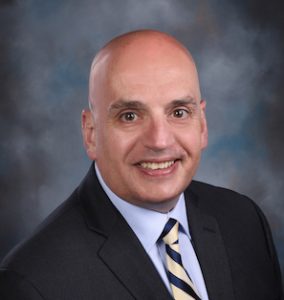
Review of events that led to the shutdown in October 2013, who’s to blame, and how emergency physicians can make the political system better
Explore This Issue
ACEP Now: Vol 33 – No 02 – February 2014The absence of government is chaos. So welcome to Washington, DC! While the U.S. Congress has previously demonstrated its unique ability to shirk its collective duty to lead our country, “Washington”—and I’ll include the president on this one—went above and beyond during the October 2013 shutdown of the federal government. Given that one of the fundamental responsibilities of Congress is to approve a budget by which the federal government is allowed to operate, it is not a stretch to say that Congress failed to earn its paycheck, which, of course, its members continued to collect, despite the furlough of thousands of other federal employees (who eventually got paid for not working). This shutdown was the third longest in the history of the country, after the 18-day shutdown in 1978 and the 21-day shutdown in 1995–1996. That tells you how truly dysfunctional things have to get for this to happen. Why the shutdown happened is, however, more about some of the fundamental challenge of politics in our nation, not just in Washington, and doesn’t bode well for the future of our country.
The details are not pretty. The federal government shutdown that lasted for 16 days in October is estimated to have cost the U.S. economy between $2 billion and $6 billion in economic output, according to a report by the Office of Management and Budget (OMB) and independent financial analysts. Approximately 120,000 fewer private-sector jobs were created during the first two weeks of October because of the dual threats of the shutdown and the standoff over the debt ceiling. Federal employees were furloughed during the shutdown for a combined total of 6.6 million days, and they received $2 billion in back pay for work they never performed. This exceeds the comparable payroll costs of $430 million (about $650 million in today’s dollars) for the November 1995 shutdown and $630 million (about $1 billion in today’s dollars) for the December 1995–January 1996 shutdown. The country’s national parks lost roughly $500 million in visitor spending nationwide, while almost $4 billion in tax refunds was delayed because the Internal Revenue Service was closed for business.
The details of the shutdown are not pretty. The federal government shutdown that lasted for 16 days in October is estimated to have cost the U.S. economy between $2 billion and $6 billion in economic output.
So why did the shutdown happen? The easy answer is “politics,” but that really doesn’t tell the whole story. We all know that Republicans and Democrats have differing views of the role of the federal government. Republicans want smaller government and less spending on entitlement programs, while Democrats believe in a bigger role for government with spending on programs to help individuals. There are philosophical differences between the two parties, not exactly earth-shattering news. While these differences may seem irreconcilable, the reality is that there have always been parties with philosophical differences running the country. Heck, short of a few years here and there when one party has held a majority in the U.S. House and Senate and had the president in the White House, this is the norm. And yet, the government doesn’t shut down every year. Historically, despite the division of authority granted by the people, the government has actually managed to get some things done. Can you imagine if the founders of this nation simply “took their ball” and went home every time they philosophically disagreed on the role of government? I’ll tell you what would have happened—nothing! Thomas Jefferson and the founders of the country would have just agreed to disagree, and you and I would be having tea and crumpets (whatever they are) and singing “God Save the Queen” at every sporting event we attend. Why is it that the functioning of the government has become more dysfunctional over the past few years?
Let’s review what happened politically to get to the shutdown. Essentially, the Republicans, led by Speaker of the House John Boehner, played a gigantic game of political chicken against the Democrats, led by Senate Majority Leader Harry Reid and President Barack Obama. This game (and I use the term very loosely here with full understanding that the shutdown had very real negative effects) was more like a schoolyard fight where two kids who don’t really want to fight get egged on by the crowd. The “crowd” for this event had many faces: the Tea Party, Sen. Ted Cruz and his 21-hour-19-minute quasi-filibuster (including reading Dr. Seuss’ Green Eggs and Ham), and maybe even the Koch brothers and all the conservative right-wing Super PACs they fund. End result: Speaker Boehner and the Republicans had their bluff called, and after 16 days, the House voted not only to fund the government but also raised the debt ceiling, all without defunding Obamacare. Kind of a lose-lose scenario for the Republicans.
How did the things get so bad? How did we get beyond partisanship in Washington to a new level of “hyperpartisanship” (an idiotic term that I am sure will be trumped by “superhyperpartisanship” by Wolf Blitzer on CNN any day now)? The answer is simple but surprisingly won’t be found in Washington or anywhere else inside the Beltway. The problem is actually in your hometown and every other town in America. It starts in the cornfields of Iowa and reaches out to every voting district in all corners of the nation. Why? Because that’s where our country is becoming more “blue” and “red” every day. In small towns, medium-sized suburbs, and big cities, the “moderate” is a dying breed, potentially doomed to extinction and perhaps an exhibit in the Smithsonian in the very near future. Doomed because the far right and far left are becoming “righter” and “lefter” every day. Doomed because our very own democratic process allows for individual members of Congress to prevent the body as a whole from doing its job. Doomed because we have lost the voice of reason in the never-ending din of hyperbole and one-upmanship that drives our political process.
Pick the one issue that you are most passionate about and then do what we do best: be a leader on that issue. Make a call to an elected official, write a letter, testify on a bill, and, yes, maybe even run for office.
So whom should we blame for the mess? A) The Democrats, B) The Republicans, or C) The Tea Party? The correct answer, of course, is D) All of the Above. And while the media may not be the lead players in this circus, they sure run away with the “Best Supporting Role” award for the 24/7/365 mind-numbing “Shutdown Countdown Clocks” that we were subjected to leading up to the shutdown. Perhaps in response to this debacle and the whopping nine-percent approval rating that they had after the shutdown, Congress has actually passed an omnibus funding bill that keeps the government open for business through Sept. 30, 2014. The implementation of this funding bill will end the automatic sequester cuts that were in place when Congress couldn’t pass a budget last year. Before you get too excited about the sequester cuts going away, note that the new budget keeps in place the two-percent Medicare cuts that were part of the sequester.
Upon further reflection, maybe the answer to the question “who’s to blame?” is really, E) You (and me). Winston Churchill once said, “The best argument against democracy is a five-minute conversation with the average voter,” a pretty harsh appraisal of the “best” form of government in the world. But ultimately, it is the sum of the whole body politic that is responsible for what we are, and aren’t, as a nation today—and, more important, what we will be in the future. We are not a nation of debt but a nation of debtors. We are not a nation of apathy but a nation of apathetic non-voters. In a world that is becoming more socially, economically, and logistically “flat” every day, our nation is losing its prominence. We are no longer the biggest, smartest, fastest kid on the block in many arenas, and our will to be better, especially in the political arena, will require us to re-embrace the qualities that made us a great nation at one time: hard work and personal responsibility. If we, as individuals, accept and embrace only the “right” or the “left” of our political leaders, then we are destined to be governed by those who are politically at two or three standard deviations out on the curve of the political spectrum. It’s time to identify and support some moderate candidates (or maybe even become one of them). Find, or be, someone who leads by listening to all sides of an argument and then finding a way to compromise and create a better good for the whole of the nation. The founders of the nation would expect nothing less.
So what can you do to make this all better? Do what we do best as emergency physicians: listen, reflect, and act. It’s what we do with all our patients. We listen to their history and gather the appropriate and necessary information in order to take the best action to fix a problem. Not all that complicated, really. But now you need to do that outside of the emergency department. Pick the one issue that you are most passionate about and then do what we do best: be a leader on that issue. Be informed and get involved, especially at the local and state levels. As an emergency physician, you carry instant “street cred” within the political arena. The general public greatly respects what we do and listens to us when we speak. Make a call to an elected official, write a letter, testify on a bill, and, yes, maybe even run for office. Your single voice and input can make a difference. Apathy and silence is what all elected officials (especially the bad ones) feed on. Commit this year to being involved on just one issue and to being the voice of moderation and reason in finding a solution to that issue. You will be amazed at what you can do to make the political system and the nation a whole lot better.
Dr. Cirillo is director of health policy and legislative advocacy for Emergency Medicine Physicians in Canton, Ohio.
Pages: 1 2 3 4 | Multi-Page




No Responses to “The U.S. Federal Government Shutdown Doesn’t Bode Well for Our Future”